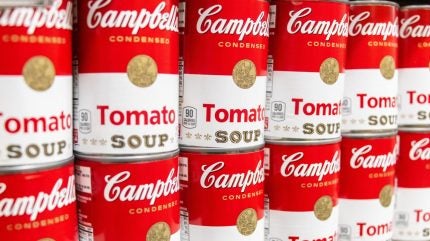
The Campbell Co. has acknowledged liability for over 5,400 infringements of US clean-water regulations at the food giant’s facility in Napoleon, Ohio.
The admission, filed in a joint court document with the plaintiffs, pertains to violations of the Clean Water Act occurring from April 2018 to December 2024.

Discover B2B Marketing That Performs
Combine business intelligence and editorial excellence to reach engaged professionals across 36 leading media platforms.
In March 2024, the US Department of Justice (DoJ), representing the Environmental Protection Agency, and the National Environmental Law Center, acting on behalf of Environment Ohio and Lake Erie Waterkeeper [the plaintiffs], each initiated separate legal actions.
The lawsuits alleged that Campbell’s violated discharge limits for phosphorus, ammonia, and E. coli, along with other pollutants.
Just Food approached Campbell’s for comment. The company said: “We have taken a number of steps to improve our operations and comply with environmental regulations. We have been part of the Napoleon community since 1938 and our goal is to reach a settlement that serves the interest of the environment and the community where our employees live and work. Importantly, the facility has had minimal, if any, adverse effects on the Maumee River or Lake Erie.”
In its lawsuit, the DoJ had said Campbell’s facility in Napoleon, which processes and cans items such as fruit and vegetable juices, sauces, and soups, “failed to comply with its permitted wastewater limits for years”.

US Tariffs are shifting - will you react or anticipate?
Don’t let policy changes catch you off guard. Stay proactive with real-time data and expert analysis.
By GlobalDataIt alleged the site’s “wastewater treatment plant is not designed to handle the wastewater generated by current operations and the discharges from the facility regularly exceed permitted limits for harmful pollutants”.
The tainted wastewater from the facility is discharged into the Maumee River, which then feeds into Lake Erie.
In a joint statement from the advocacy groups involved, Sandy Bihn, Lake Erie Waterkeeper since 2004, explained: “Pollution flowing into western Lake Erie from the Maumee River, containing Campbell’s phosphorus discharges, contributes to the lake’s toxic algal blooms.”
The joint stipulation, filed in the US District Court for the Northern District of Ohio, records Campbell’s agreement not to contest its liability in the case.
According to the statement, the company also acknowledged the legal standing of the citizen groups, whose members have been affected by the pollution.
John Rumpler, the clean water programme director for Environment Ohio, added: “Campbell’s admission that it committed these violations will speed this case toward a trial that will decide what steps the company must take to curb its pollution and how large a civil penalty should be imposed.
“We appreciate Campbell’s willingness to work cooperatively with us and the federal government to solve its compliance problems, rather than spending time and effort contesting clear-cut violations of the Clean Water Act.”
Under the Clean Water Act, private individuals can initiate legal proceedings against offenders in a federal court, in pursuit of civil penalties and judicial mandates to halt infractions and rectify environmental damage.





